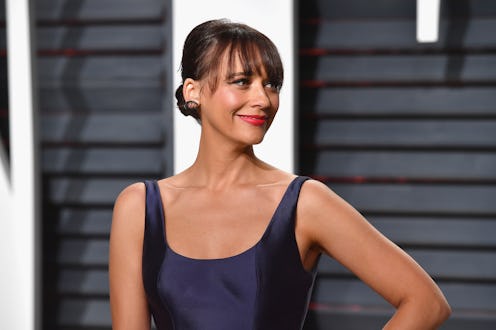
We're in the midst of a time when many victims of alleged sexual misconduct have been empowered to come forward after years of silence. But during this time, it's important now more than ever to have the facts straight. The reason Rashida Jones left Toy Story 4, for example, became a news item, but, according to the actor, it had nothing to do with what many outlets were claiming it did.
It was reported that the reason for Jones' exit was unwanted advances from John Lasseter, which made a connection between the 41-year-old's departure and the Pixar co-founder's leave of absence following multiple allegations of misconduct. (In a statement, Lasseter apologized for what he called "missteps" and promised to take a step back to evaluate his actions.) But Jones insists she had no such experiences and made no such claims. She and her writing partner Will McCormack released a statement to The New York Times, clarifying:
"The breakneck speed at which journalists have been naming the next perpetrator renders some reporting irresponsible. We did not leave Pixar because of unwanted advances. That is untrue. We parted ways because of creative and, more importantly, philosophical differences."
Jones and McCormack had been announced as the co-writers for Toy Story 4 all the way back in January 2016, with Lasseter slated to direct. And while the duo did indeed depart the project early on, the writing partners claim that their decision was related not to actions by any individual. Instead, they trace their departure to what they allege is a problematic culture at the studio at large. Their statement continues:
"There is so much talent at Pixar, and we remain enormous fans of their films. However, it is also a culture where women and people of color do not have an equal creative voice."
Bustle reached out to Disney and Pixar for comment, but did not receive an immediate response. It's not the first time an issue like this has been raised; as Vanity Fair writes, Pixar has been plagued with complaints like these for decades.
Out of the 19 films that the studio has released since 1995, only three have had female leads — 2012's Brave, 2015's Inside Out, and 2016's Finding Dory. That math comes out to just 16 percent, and it also shouldn't escape your notice that all three films were released in the past five years. Prior to Brave's Princess Merida of DunBroch, the studio had maintained a 17 year streak of projects focused on male protagonists.
It's something that Jones actually spoke to when she first signed on to co-write the fourth film in the Toy Story franchise. It was set to explore the relationship between Woody and Bo Peep, and the writer and actress told Refinery29 that she was looking forward to boosting female representation a bit.
"Hopefully it will be another great strong female character to balance out the still ridiculously male-centric industry of media that’s supposed to represent real life. Hopefully, it will add to that balance."
The New Statesmen reports that, of those 19 films released since 1995, every single one has been directed by a white man. The New Statesman does include some caveats, such as a female co-director or a Filipino editor with a co-credit, but also point out that both future Pixar projects also have Caucasian male directors attached. (Incredibles 2 will be helmed by Brad Bird, and Josh Cooley will direct Toy Story 4.) Finally, the outlet pointed out that, "of the 109 major writing credits across Pixar’s films, only 11 go to women or people of colour," a rate of just over 10 percent.
In a 2011 Esquire profile, Lasseter seemed ignorant to the problems inherent in Pixar's lack of representation. He proudly described the group of directors he pulls from as "all family men," and later refers to them as the "creative brain trust of the company." In fact, he even cites this family man stereotype as the philosophy behind Pixar:
"We all have kids, we all have amazing wives. And we love to go see movies. We love to see movies, and we love to take our families to see movies. So we make the kind of movies we love to watch. If you talk about a philosophy we all have, that's it."
While that interview may have been six years ago, it appears that not much as changed since then.